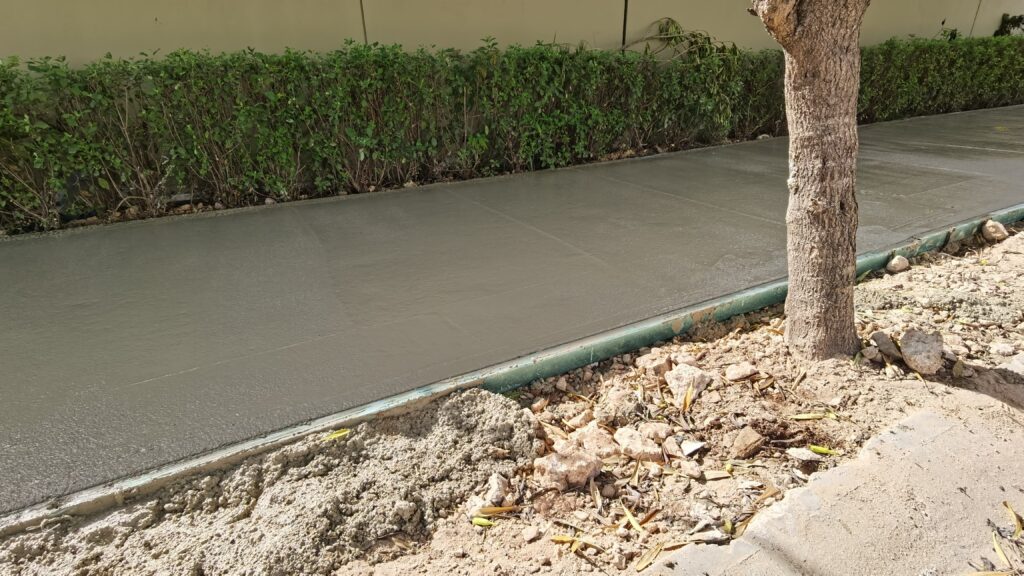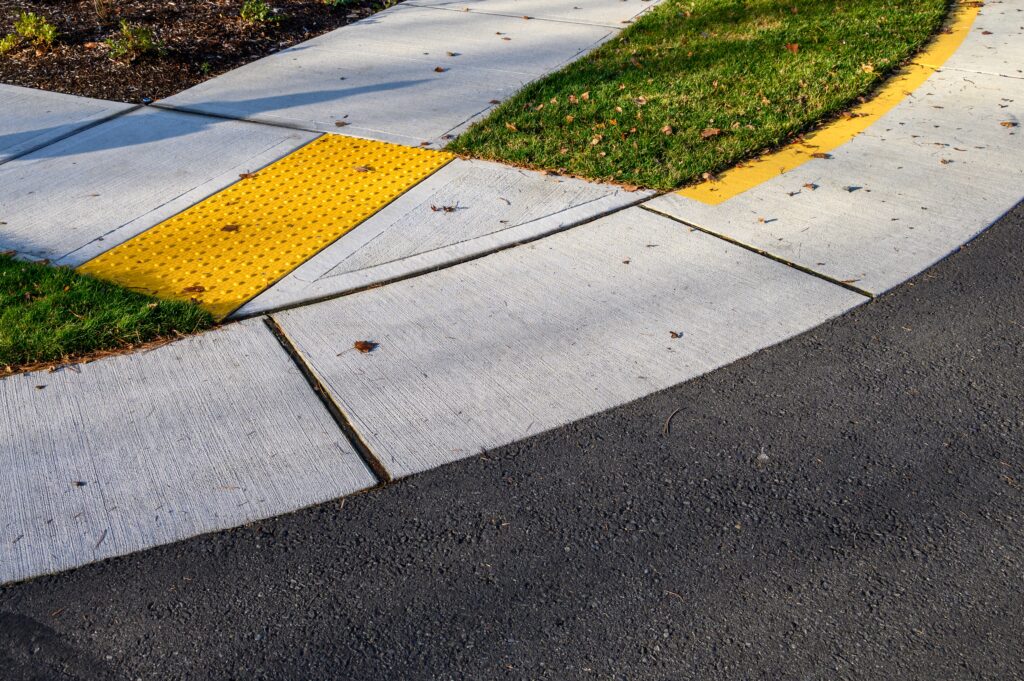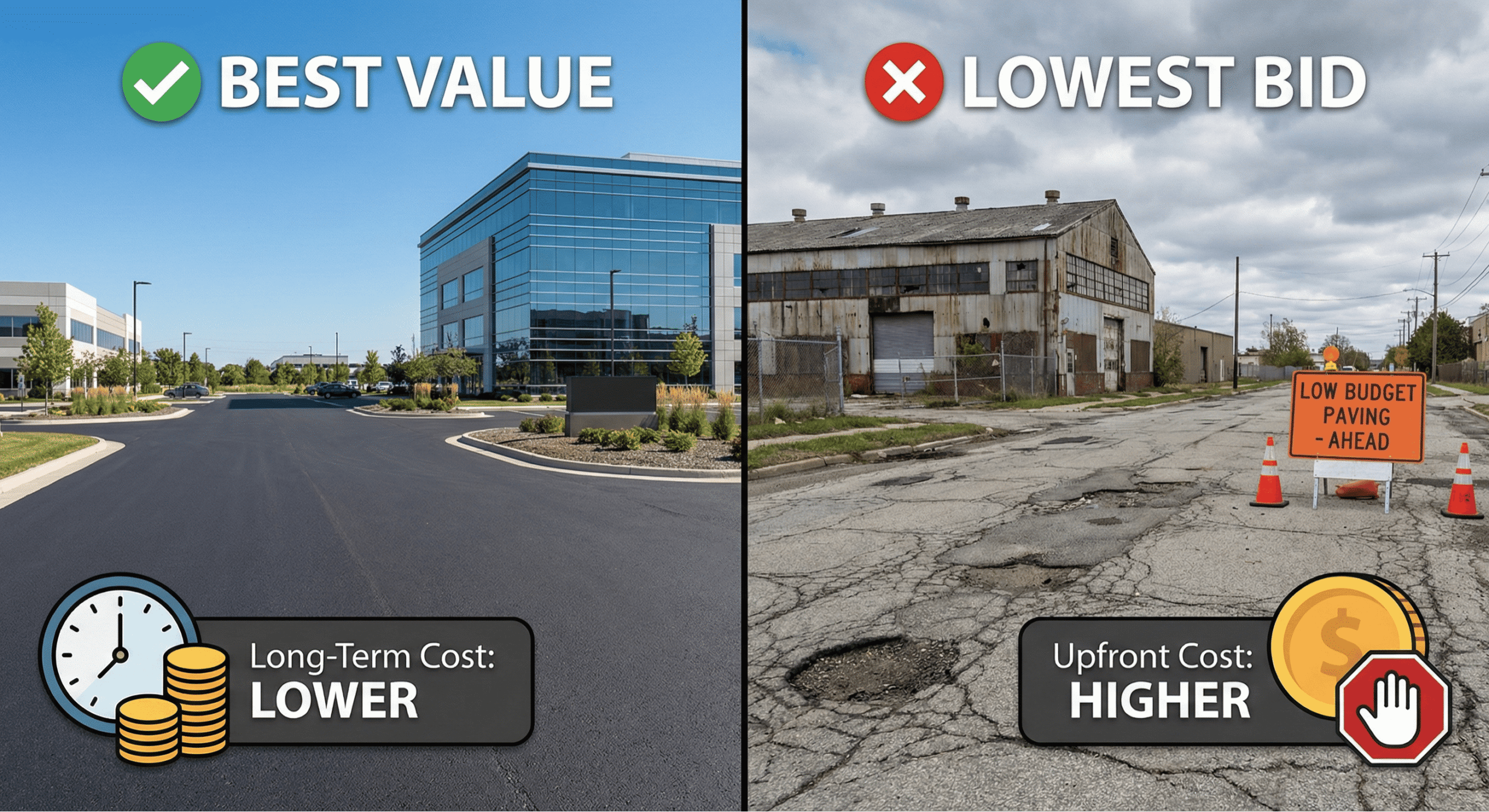
Concrete sidewalks are more than walkways; they’re essential infrastructure that connects communities, supports businesses, and ensures pedestrian safety. Professionally installed sidewalks improve accessibility, comply with regulations, and last longer under Denver’s demanding climate.
According to the U.S. Environmental Protection Agency (EPA), safe, well-maintained sidewalks encourage walking, improve accessibility, and reduce pedestrian accidents in urban areas.
For Denver, where sidewalks endure freeze-thaw cycles, heavy snow, and high pedestrian traffic, professional installation is critical.
In this blog, we’ll cover why expert sidewalk installation matters, the key benefits, Denver-specific challenges, and how property owners can ensure safety and compliance.
Why Professional Sidewalk Installation Matters
Professional installation ensures that sidewalks are not only functional but also durable and compliant with safety standards.
- Long-Term Durability: Expert contractors use the right concrete mix, reinforcement, and curing techniques to ensure the concrete withstands Denver’s climate and pedestrian loads.
- Safety and Accessibility: Professionally installed sidewalks reduce trip hazards and ensure smooth, level surfaces for pedestrians, strollers, and wheelchairs, providing a safe and accessible environment.
- Compliance with Regulations: Sidewalks must follow ADA guidelines for slope, width, and surface conditions. Improper installation can result in liability issues or fines.
The Federal Highway Administration (FHWA) emphasizes that pedestrian infrastructure constructed to standards can significantly reduce the incidence of fall-related injuries.
Can property owners install sidewalks themselves?
Technically, yes, but without professional expertise, DIY sidewalks often fail quickly and may not meet Denver’s codes or ADA requirements.
Key Benefits of Professional Concrete Sidewalk Installation
Properly installed sidewalks aren’t just functional; they deliver long-term safety, durability, and value for your property.
- Enhanced Safety: A correctly poured and finished sidewalk eliminates uneven slabs, surface cracks, and trip hazards, significantly reducing the risk of falls and liability.
- Increased Lifespan: Professional installation ensures proper mix, reinforcement, and curing. Over time, this leads to sidewalks that last decades with minimal repairs, far outperforming poorly built alternatives.
- Better Curb Appeal: Smooth, uniform surfaces sidewalks boost visual appeal of your property. Neat sidewalks send a message of care and professionalism to clients, residents, and visitors. Code and ADA Compliance
- Code and ADA Compliance: Experienced contractors ensure sidewalks meet local Denver standards for accessibility, drainage, slope, and materials, helping you avoid fines or non-compliance issues.
A publication from ASCE highlights that infrastructure designed and built to engineering standards withstands stresses and environmental impacts far better than substandard construction, thereby supporting more resilient and durable facilities.
How long should a concrete sidewalk last in Denver?
With proper installation and maintenance, concrete sidewalks typically last 30 to 40 years in Denver’s climate.
Sidewalk Challenges in Denver’s Climate
Denver’s weather conditions make sidewalks vulnerable if not professionally installed.
- Freeze-Thaw Damage: Moisture seeps into small cracks, expands when frozen, and causes slabs to heave or break.
- High-Altitude Sun: Stronger UV exposure dries concrete more quickly, which can lead to premature surface wear if curing isn’t handled correctly. If you start to see premature cracks in concrete surfaces, it’s best to address them immediately.
- Snow and De-Icing Chemicals: Frequent snow removal and the use of de-icing chemicals can cause concrete surfaces to weaken over time.
Can sealers protect sidewalks from Denver’s winters?
Yes. Applying a protective concrete sealer after installation can reduce water penetration and protect against freeze-thaw damage.
Cost Savings with Professional Installation
While professional services may seem more expensive upfront, they reduce costs in the long run.
- Fewer Repairs: Quality installation prevents early cracking and settlement.
- Lower Liability: Safe sidewalks reduce trip-and-fall claims.
- Extended Lifespan: Professional work ensures sidewalks last decades, not years.
- Predictable Budgeting: Preventive care reduces unexpected repair bills.
Is professional installation more cost-effective than repairs?
Yes. Investing in proper installation reduces the need for costly, repeated repairs down the road.
Signs Your Property Needs New Sidewalk Installation
Even well-built sidewalks patching no longer solves the problem. Watch for these issues to know when replacement, not spot repairs, is the smarter, safer move.
- Uneven or Heaving Slabs: Panels that have lifted or sunk create trip hazards and typically indicate base failure or freeze-thaw movement, which simple patching won’t correct.
- Deep Cracks or Widespread Damage: Hairline cracks can be sealed, but interconnected or deep cracking indicates structural distress that typically requires replacing sections.
- Drainage Problems: If water pools along or across the walk, grading or settlement is likely at fault. Persistent ponding accelerates damage and often calls for regrading with new panels.
- Faded, Deteriorated Concrete: When the surface has scaled, flaked, or shows exposed aggregate across wide areas, the slab has lost its durability and is nearing the end of its life.
- Frequent Patching That Doesn’t Hold: If fixes fail quickly or problems keep returning, the underlying cause is structural; replacement is more cost-effective than chasing patches.
FHWA’s Guide for Maintaining Active Transportation Infrastructure indicates that sidewalk displacements greater than 0.5 inches fall outside the scope of what short-term grinding or beveling can address as a long-term solution, signaling the need for more substantial corrective work (e.g., panel replacement or reconstruction).
Can damaged sidewalks be repaired instead of replaced?
Yes, minor cracks or small offsets can often be repaired. However, when you observe widespread heaving, deep cracking, or persistent drainage issues, replacement is the more effective long-term solution.
Best Practices for Concrete Sidewalk Installation
To ensure quality and durability, professionals follow industry best practices:
- Use the correct concrete mix for Denver’s climate
- Install proper reinforcement (rebar or mesh)
- Ensure proper grading and drainage to avoid pooling
- Cure concrete under controlled conditions for maximum strength
- Apply sealers to protect against moisture and chemicals
How long does it take before a new sidewalk is ready for use?
Generally, sidewalks can handle foot traffic within 24-48 hours, but full strength develops over about 28 days.
Who Benefits Most from Professional Sidewalk Installation

Professional sidewalk installation provides lasting safety, accessibility, and value, but some types of properties and projects gain the most from these services.
- Commercial properties: Provide safe access for customers and visitors
- HOAs and apartment complexes: Improve resident safety and property value
- Schools and healthcare facilities: Ensure ADA compliance and protect vulnerable pedestrians
- Municipal projects: Build long-lasting community infrastructure
Do businesses in Denver need permits for sidewalk installation?
Yes. Most sidewalk projects require city permits, inspections, and compliance with Denver Public Works standards.
Choosing a Sidewalk Contractor in Denver
The quality of your contractor determines the success of the project. At Asphalt Coatings Company, we offer expert concrete sidewalk installation services throughout Denver and the Front Range.
- Decades of experience in commercial concrete projects
- In-house crews and equipment for consistent quality
- Knowledge of Denver codes and climate challenges
- Proven track record with local businesses and institutions
Should I Request References Before Hiring a Contractor?
Yes. A reliable contractor will provide references, past project photos, and a clear scope of work before beginning.
Protect Your Denver Property with Professional Sidewalk Installation
Sidewalks are a crucial component of safe, accessible, and visually appealing properties. In Denver’s climate, professional installation ensures they last longer, reduces liability, and meets regulatory standards.
At Asphalt Coatings Company, we’ve been trusted by property owners since 1986 for concrete and asphalt services across the Front Range.
Contact us to request a free quote for safe, durable, and long-lasting sidewalks.
Frequently Asked Questions
1. How thick should a concrete sidewalk be in Denver?
Typically, 4 inches is used for standard applications, but areas with heavy loads may require 6 inches or more.
2. How often do sidewalks need replacement?
Most sidewalks last 30-40 years, depending on the climate and the level of maintenance.
3. Are Denver property owners responsible for sidewalk maintenance?
Yes. In most cases, property owners are responsible for repairing sidewalks adjacent to their property.
4. What type of concrete is best for sidewalks in Denver?
Air-entrained concrete is commonly used, as it resists freeze-thaw damage.
5. Can sidewalks be installed year-round in Denver?
No. Ideal installation occurs in spring through fall, when temperatures support proper curing.



